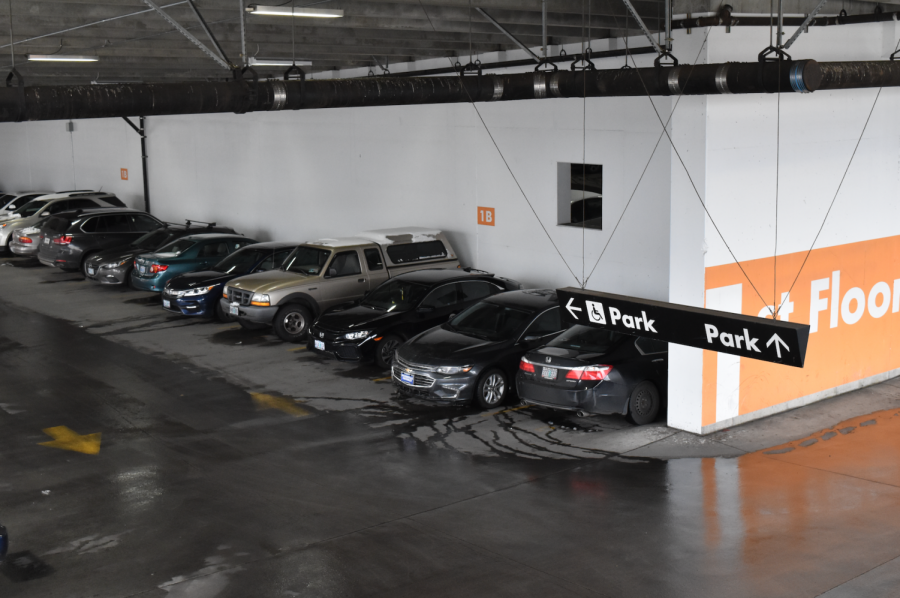OSU encourages alternative solutions to students’ parking complaints
March 11, 2019
Students and faculty facing frustration while finding on-campus parking are encouraged by Oregon State University to consider alternative transportation methods.
The Transportation Services office believes the amount of spaces on campus is sufficient to the needs of drivers. In response to the many students are frustrated by the current amount of parking, Transportation Services suggests pursuing alternatives to driving alone such as carpooling, walking or biking to aid in decreasing the demand for on-campus parking.
The annual report from the Transportation Services Director reported that 30,084 students and employees attended OSU in the fall of 2017, and 36 percent of these people drove alone to campus. Based on this data, 10,830 single drivers on average need spots on campus daily, with only 6,181 commuter and residential parking spots offered. While not all these drivers may be on campus and require parking at the same time, this gap still leaves some students dissatisfied with the current on-campus parking situation.
Jenevieve Jones, a second-year pre-mechanical engineering major, said the lack of on-campus parking has caused the overflow of OSU drivers to begin parking in her neighborhood, leading to insufficient parking for renters and homeowners in the area.
“It really diminishes the value of living close to campus when I have to park several blocks away from my own home, because everyone else sees the convenience, too,” Jones said.
Those looking to find parking on-campus will face an even greater challenge during the middle of the day or game days, the school’s busiest times, said Grace Yeo, second-year biochemistry major. Yeo said parking becomes near impossible to find when the campus is busy, forcing her to find more obscure places to park.
“Parking in OSU is a pain during the peak hours on campus, because there are never spots available. Especially on weekdays, parking just isn’t even accessible,” Yeo said.
Meredith Williams, OSU Transportation Services director, said currently the volume of parking demanded by the population of OSU purchasing parking permits is met by the number of spaces on campus.
Those who wish to regularly park on campus can purchase daily, hourly or annual parking passes. These passes give access to parking lots on campus that are categorized into four zones: Commuter Zone, Residence Hall, Nonpublic and Non-OSU. The OSU Parking Utilization Study of 2017-18 said Transportation Services has chosen to use zonal parking in recent years to utilize on-campus parking effectively to reduce the overflow of commuters parking in surrounding neighborhoods and streets.
According to the same study, 7,981 annual or monthly passes were sold in fall term of 2018. The parking lots in zones associated with higher parking permit prices tend to have a lower utilization rate. Passes for zones A-1, A-2 and A-3 are sold for $522 and had only 51 percent utilization while passes for zone C are sold for $108 and had a utilization rate of 72 percent.
This data and observable trends has led some to believe that the issue for many drivers isn’t space, but price. Jones said many of the commuters she’s met parking in her neighborhood are those without a permit who can’t afford to park on campus.
Williams said Transportation Services promotes alternatives to single drivers driving to campus that are a more cost-effective and environmentally sound choice than adding additional parking spots on campus.
“Taking transit, walking, carpooling or bicycling to campus is environmentally sound and helps OSU avoid the need to build new parking spaces that cost an average of $9,000 per ground-level space or at least $30,000 per space in a parking structure,” Williams said.
Transportation Services is currently working closely with the OSU Sustainability Office and partners with the Student Sustainability Initiative to further improve the on-campus parking situation. Along with encouraging environmentally-friendly modes of transportation, Transportation Services also supports companies like ZipCar, Pedal Corvallis, Beaver Bike Rentals and the Beaver Bus to offer more commute options to students and faculty.
























































































































